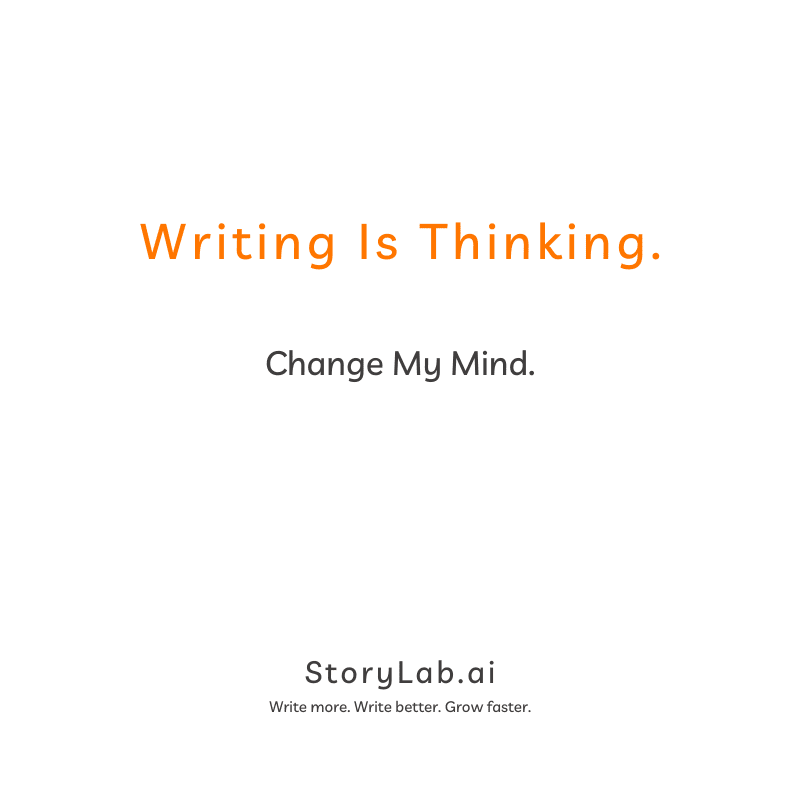How Journaling Helps You Become A Better Writer (And A Better Human Being)
Why Journaling has become such an important part of my life and my coaching for writers
Journaling helps. It really does. I have felt much better, happier and healthier when I journaled every day. And much less focussed and self-directed when I wasn’t.
I even ran into a burnout one day when I had dropped the habit of journaling for a few months. And journaling helped me get back out of that state.
Journaling not only helps you stay more focused. When done the right way it can help you become a much better writer, too.
One of the pilot students in my Growth Storytelling program even told me he saw his output as an entrepreneur double over the period he started using this journaling method daily.
Amazing, right?
Here’s how journaling – and specifically the Daily Growth Journaling exercise I use and recommend my students – can help you become a better writer and a better human being.
Journaling helps you become more mindful
What is journaling ft not a written exercise in mindfulness? Especially in my method – but in pretty much any kind of journaling I’ve heard of – you’re practicing focus on your inner feelings, and most inner thoughts. At least to some degree.
How this helps you become a better writer?
Writing almost always has as one of its (sub)goals to make a connection with someone. This is much easier if you know what you really want to say, and what really matters to you emotionally.
If you can tap into what matters inwardly, you have a far better chance of getting that across in your writing.
How this helps in life and in your personal growth?
So much about becoming a better person today than you were yesterday has to so with knowledge of self. This is what practicing mindfulness on a daily basis trains you for.
Look at journaling and practicing Self-reflection as a form of daily yoga for your soul.
Journaling helps you structure your thoughts and feelings
Regardless which exact form of journaling you’re using, you’re almost always writing.
Writing means thinking. That is, writing means structuring thoughts and feelings into phrases and sentences that, well, make sense.
This is a primary function of writing, and one that you necessarily practice every time you put pen to paper to journal.

Journaling helps you focus on what’s important
Especially if you give yourself a limited time-frame and a structure for your journaling, it helps you focus. What’s important enough to write down in the limited space and time you decided to make available for this?
Understanding what you really feel, having been able to structure your thoughts and feelings into something that makes sense, and lastly knowing what’s more important than anything else;
These are some of the most important basics of writing and communicating.
These are truly the most important, though by far not the only ways on which daily journaling can help make you a better writer.
And please, you tell me – what kind of added benefit would it have in life in general to train your understanding of what matters most to you daily?
Wrapping up
So that’s how you can use journaling to become a better writer, and to grow as a human being. To summarize, journaling helps you:
- To become more mindful of what’s really captivating your thoughts and feelings around subjects and in the moment, and hence what you should and shouldn’t be writing about;
- To structure your thoughts and feelings (which is a large part of what writing and communicating are);
- To focus on what’s important — in life as well as in storytelling and writing.
So, now it’s up to you. Want to try out journaling in order to become a better writer?
Check out my Daily Growth Journaling exercise, here. And please let me know how I can help you in trying it out and making it work.
Growth Journaling is part of a broader framework for storytelling as a means for personal and business growth, that I call “Growth Storytelling”. Keep an eye out for my upcoming book — for which the working title formerly was “Legend Storytelling” — read more, here.
Also do check out StoryLab.ai, the AI Marketing Copy Generator that helps you write more and faster and also helps you become a better storyteller.
FAQ
What is journaling?
Journaling is the practice of regularly writing down thoughts, feelings, and experiences as a means of reflection, self-expression, and mindfulness.
How can journaling benefit mental health?
Journaling can improve mental health by providing an outlet for expressing emotions, reducing stress, clarifying thoughts, and promoting self-awareness.
What are some popular types of journaling?
Popular types include bullet journals, gratitude journals, dream journals, travel journals, and reflective or therapeutic journals.
How often should one journal for effectiveness?
The effectiveness of journaling often depends on personal goals, but many find daily or several times a week to be beneficial.
Can journaling help with goal setting and achievement?
Yes, journaling can aid in goal setting and achievement by allowing for tracking progress, reflecting on obstacles, and maintaining focus on objectives.
What materials are needed to start journaling?
Basic materials include a notebook or journal and a pen, but some may prefer digital tools like apps or word processors.
How does journaling differ from keeping a diary?
While similar, journaling often focuses more on thoughts, feelings, and reflections, whereas a diary typically records daily events and activities.
Can journaling improve creativity?
Yes, journaling can enhance creativity by encouraging free expression, exploring ideas, and developing thoughts without constraints.
Is there a specific structure one should follow in journaling?
Journaling doesn’t have a strict structure; it’s flexible and can be adapted to personal preferences, whether structured or free-form.
How can one maintain privacy and security when journaling?
Keeping a journal in a secure place, using password-protected digital tools, or even using coded language can help maintain privacy and security.
Related articles
Author bio:
 Erwin Lima: What inspires Erwin is helping people, teams and brands to become the best version of themselves. Guiding them with curiosity, empathy, and Growth Storytelling.
Erwin Lima: What inspires Erwin is helping people, teams and brands to become the best version of themselves. Guiding them with curiosity, empathy, and Growth Storytelling.
Over the past 10+ years as a copywriter, author, consultant, and coach, he’s helped dozens of Brands, Teams, and individual human beings to grow their sense of motivation and focus, but also their reach, engagement, and revenue— through the power of their own story. You can find Erwin on LinkedIn and on his website.
Interesting articles
- Unleashing AI’s Potential in Your Digital Marketing Agency
- Harnessing Digital Mind Mapping for Crafting Engaging Storylines
- Top 5 Marketing Strategies For Cardiologists
- 10 Essential Tips for Optimizing Your Shopify Store
- Enterprise Software: What It Is, How It Works, Case Studies
- Influencer Marketing Strategies for Success
- Revolutionizing Short Films: Unlocking AI’s Creative Potential in Video Production
- How Content Creators Can Share Their Internet Without Losing Control of Their Network
Master the Art of Video Marketing
AI-Powered Tools to Ideate, Optimize, and Amplify!
- Spark Creativity: Unleash the most effective video ideas, scripts, and engaging hooks with our AI Generators.
- Optimize Instantly: Elevate your YouTube presence by optimizing video Titles, Descriptions, and Tags in seconds.
- Amplify Your Reach: Effortlessly craft social media, email, and ad copy to maximize your video’s impact.